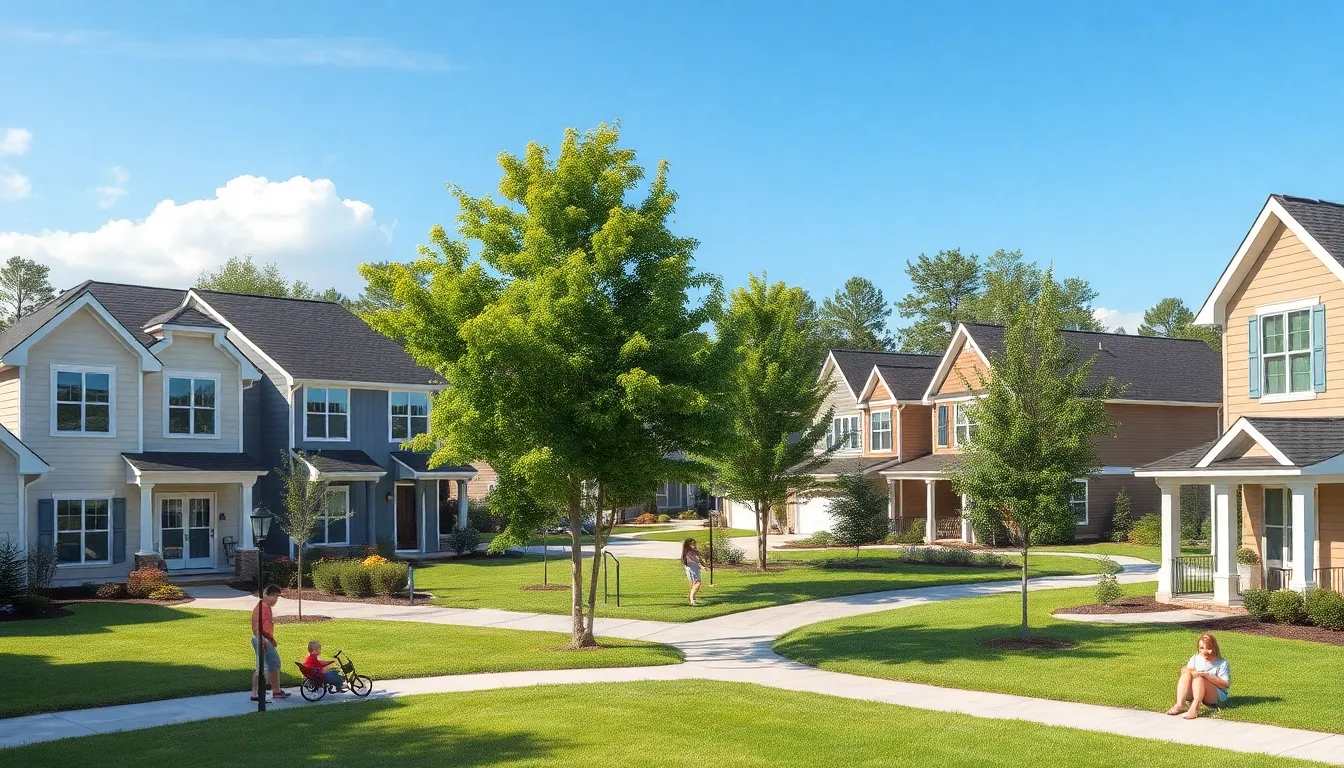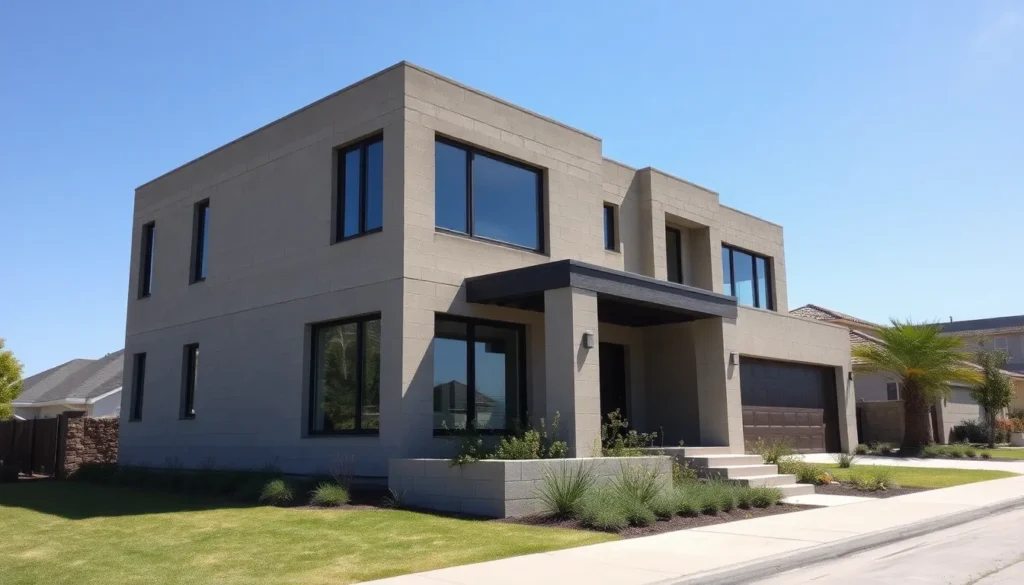Buying a home is a big deal. It’s not just about finding a roof over your head; it’s about choosing a place where memories are made, barbecues are had, and the occasional awkward neighbor encounter happens. With so many cities vying for the title of “Best Place to Buy a Home,” it’s easy to feel overwhelmed. But fear not! This guide will help navigate the real estate jungle and uncover the gems where your dream home awaits.
Table of Contents
ToggleOverview of the Best Cities to Buy Home
Choosing the best city to buy a home involves analyzing multiple factors. Homebuyers often assess local economies, job markets, and school districts. Notably, cities with booming job markets attract potential homeowners eager to invest.
Affordable housing options remain vital for many families. Cities like Austin, Texas, offer a mix of culture, job opportunities, and reasonable housing prices. Furthermore, cities such as Raleigh, North Carolina, showcase strong tech sectors and competitive pricing.
Safety ranks high on many buyers’ lists. Communities with low crime rates enhance the appeal of neighborhoods. For instance, cities like Frisco, Texas, combine safety with vibrant community engagement.
Access to amenities influences buyers’ decisions. Cities that feature extensive parks, recreational spaces, and dining options stand out. San Diego, California, is an example of a city where outdoor activities thrive alongside thriving urban life.
Market stability also plays a crucial role. Locations with consistent appreciation in home values attract investors seeking long-term gains. Denver, Colorado, presents a solid choice for those aiming for both lifestyle and investment potential.
Ultimately, identifying the best cities for home buying requires looking at these critical dimensions. Prioritization based on local market conditions, lifestyle preferences, and personal circumstances enables informed decision-making. Each city, with its unique attributes, offers distinct advantages for potential homeowners.
Factors to Consider When Choosing a City

Selecting the right city for home buying involves multiple crucial factors. Each element plays a significant role in determining long-term satisfaction and investment potential.
Cost of Living
Cost of living encompasses various expenses, such as housing, transportation, and utilities. Affordable cities often have lower housing markets, allowing homebuyers to maximize their budgets. For instance, Raleigh, North Carolina offers a balanced cost structure, combining reasonable home prices with accessible daily expenses. Monthly expenses can vary significantly from one city to another, making it essential for buyers to assess their financial capabilities accordingly. Understanding these aspects helps potential homeowners avoid unexpected financial burdens.
Job Opportunities
Job opportunities greatly influence the attractiveness of a city. A thriving local job market increases economic stability and supports home values. In cities like Austin, Texas, the technology sector drives demand for skilled workers, leading to a robust employment landscape. Access to diverse industries also contributes to long-term career growth. City populations often expand due to new job openings, increasing housing demands. Proper evaluation of job prospects should take priority during the decision-making process to ensure future security.
Quality of Schools
Quality of schools directly impacts property values and community desirability. Strong school districts attract families seeking excellent educational options for their children. In Frisco, Texas, highly rated schools enhance the city’s appeal, fostering a sense of community involvement. Excellent academic performance often correlates with higher home prices, as families prioritize access to quality education. Evaluating school ratings and programs should be a focal point when selecting a city to buy a home, as it affects both lifestyle and investment potential.
Top 5 Best Cities to Buy Home
Identifying the best cities for home buying involves examining various critical factors. Below are the top five choices based on economic stability, accessibility, and community value.
City 1: Highlights and Market Trends
Austin, Texas, stands out due to its robust technology sector. Significant job growth fuels a competitive housing market, attracting both families and young professionals. The diverse cultural scene enhances lifestyle appeal. Median home prices, while higher than the national average, are balanced by strong wage growth. Local schools receive high ratings, boosting the area’s desirability. Additionally, outdoor activities and vibrant nightlife cater to various interests.
City 2: Highlights and Market Trends
Raleigh, North Carolina, presents a blend of affordability and economic opportunity. The city benefits from a burgeoning job market, particularly in tech and research fields. Housing remains relatively affordable, allowing buyers to stretch their budgets further. Strong public schools contribute to community value, securing the appeal for families. Proximity to mountains and coastlines enhances leisure options. A growing number of amenities, such as parks and dining spots, enrich daily living experiences.
City 3: Highlights and Market Trends
Frisco, Texas, excels as a family-friendly community. It boasts some of the lowest crime rates nationally, enhancing its appeal for safety-conscious buyers. Excellent school systems drive demand for homes, leading to steady property value appreciation. Access to sports, dining, and shopping options creates a vibrant community atmosphere. The area’s economic stability appeals to both buyers and investors alike. Strong local governance supports continued growth and development.
City 4: Highlights and Market Trends
San Diego, California, captures attention with its coastal lifestyle and diverse recreational options. A strong job market, particularly in biotech and defense, attracts new residents. Despite higher home prices, the area’s quality of life justifies the investment. Homebuyers enjoy access to top-rated schools and numerous public amenities. The welcoming climate and cultural diversity also enhance community engagement. Outdoor enthusiasts appreciate the nearby beaches and parks.
City 5: Highlights and Market Trends
Denver, Colorado, is known for its impressive mountain views and outdoor activities. Economic growth fueled by sectors like technology, healthcare, and energy supports a thriving job market. Home prices remain competitive, driven by high demand and limited inventory. Strong public schools contribute to appeals for families. The area’s rich cultural scene, combined with recreational opportunities, improves overall lifestyle satisfaction. Buyers often find long-term investment potential in this market.
Tips for Homebuyers
Understanding the local real estate market is essential for homebuyers. Start by analyzing recent sales data in the desired area. Gather information on home values, trends in price appreciation, and the average time homes spend on the market. Utilize resources like Zillow, Redfin, and local real estate agency websites. Engage with local real estate agents who can provide insights into neighborhood specifics. Examine community factors such as school ratings and crime statistics. Utilize social media platforms or community forums to get perspectives from current residents. Following these steps sets a solid foundation for making informed decisions.
Financial preparation plays a crucial role in the homebuying process. Begin by evaluating personal finances, including income, expenses, and credit scores. Create a budget that accounts for down payments, closing costs, and moving expenses. Explore various mortgage options available in the market. Speak with mortgage lenders to understand interest rates and qualify for pre-approval. Assess potential monthly mortgage payments while factoring in property taxes and homeowners insurance. Allocate funds for home maintenance and unexpected repairs post-purchase. Being financially equipped empowers buyers to make confident decisions.
Finding the right city to buy a home is a significant decision that requires careful consideration. Each city offers unique advantages that cater to different lifestyles and preferences. Whether it’s the job opportunities in Austin or the family-friendly environment of Frisco, homebuyers have plenty of options to explore.
By focusing on essential factors like economic stability, safety, and community amenities, potential buyers can make informed choices that align with their long-term goals. With the right research and preparation, anyone can discover a city that not only meets their housing needs but also enhances their quality of life. Embracing this journey can lead to a fulfilling homeownership experience.













